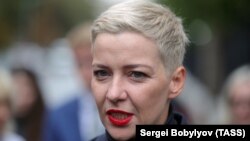Ukraine has denounced as a forced expulsion the arrival of missing Belarusian opposition activists Anton Randyonkau and Ivan Krautsou on its territory, and claims that missing opposition leader Maryya Kalesnikava, reportedly now in Belarusian custody, “took action” en route to the Ukrainian border to prevent her own expulsion from Belarus.
After a day of silence from Belarusian officials about their disappearances, State Border Committee Chairman Anton Bychkouski alleged earlier on September 8 that Kalesnikava, a member of the leadership of the Coordination Council now representing Belarus’ protest movement, Coordination Council spokesman Anton Randyonkau and Executive Secretary Ivan Krautsou, had voluntarily left Belarus for neighboring Ukraine, a frequent destination for critics of Belarusian President Alyaksandr Lukashenka.
In an official statement, Bychkouski said that the three had traveled in a BMW through Belarusian customs control at the Aleksandrovsk checkpoint on the Belarusian-Ukrainian border at around 5 a.m. on September 8.
He stated that Kalesnikava had been "pushed out" of the vehicle as it “accelerated sharply” toward the Ukrainian border, “threatening the life of a border service soldier.”
Bychkouski later claimed Randyonkau and Krautsou had been detained on Ukrainian territory -- an assertion Ukraine's own State Border Control Service denied to Radio Free Europe/Radio Liberty's Belarusian Service.
Two government-controlled Belarusian media outlets, the BelTA news agency and the Belarus 1 TV channel, reported that Kalesnikava was detained at the Belarusian border while “illegally” trying to enter Ukraine.
Both outlets, which ignored initial reports of the trio’s disappearance on September 7, have now posted an “exclusive” video message on Telegram from Krautsou that was allegedly recorded “a few minutes” before crossing into Ukraine. How BelTA and Belarus 1, which function as government mouthpieces, acquired the message is not clear.
In the video, Krautsou states – “emotionlessly,” in BelTA’s telling -- that he has “made the decision to leave the country.”
“Now we, including Maryya Kalesnikava, will cross the border of the Republic of Belarus and leave it for a while,” he said before turning off the camera.
Writing on Facebook, Ukrainian Deputy Interior Minister Anton Gerashchenko exclaimed that “[I]t wasn’t a voluntary trip!”
The Belarusian government staged a forcible expulsion to make it appear that “opposition leaders throw hundreds of thousands of protesters against Lukashenko's regime and [then] flee to cozy Ukraine,” Gerashchenko charged.
Without elaboration, he asserted that Kalesnikava “was not able to be removed from Belarus because this brave woman took action to prevent her movement across the border.”
“All responsibility for her life and health is personally carried by Alexander Lukashenko,” he added, writing in English.
The State Border Guard Service of Ukraine on September 8 confirmed that Randyonkau and Krautsou are on Ukrainian territory, at a checkpoint “within the Kyiv region,” and “undergoing the necessary border control measures” to cross into Ukraine. It confirmed that Kalesnikava was not with them.
The disappearance of Kalesnikava and her two colleagues followed the opening of a criminal case by Belarus’ Investigative Committee, which handles pre-trial criminal investigations, into a supposed attempt by the Coordination Council’s presidium to seize power.
On the morning of September 7, as Kalesnikava reportedly headed to the post office to pick up a communication from the KGB and Interior Ministry, a woman saw masked individuals pushing Kalesnikava into a mini-van marked Svyaz (Communication) in downtown Minsk, TUT.by reported.
Rodnenkov and Kravtsov disappeared after they went to Kalesnikava’s apartment to check on her whereabouts.
Kalesnikava’s relatives earlier had filed a complaint with the police about her disappearance. The police stated that they were searching for the activist, according to the Russian state news agency TASS and an outlet linked to jailed would-be Belarusian presidential candidate Viktar Babaryka, whom Kalesnikava represents.
The Ministry of Internal Affairs on September 7 stated that it had no information about Kalesnikava’s disappearance. The State Security Committee, or KGB, did not comment.
German Foreign Minister Heiko Mass on September 7 had demanded to know the whereabouts of Kalesnikava and for "the release of all political prisoners in Belarus." In turn, British Foreign Secretary Dominic Raab called for the Belarusian government to make Kalesnikava's "safe return their highest priority."
The reports about Kalesnikava and her two colleagues follow the departure, willingly or otherwise, of several of the Belarusian opposition’s leading members from the Eastern European country.
Most recently, another member of the Coordination Council’s leadership team, Olga Kovalkova, reported that the KGB forcibly expelled her from Belarus in late August, after a court sentenced her to another 15 days of arrest for participating in an unsanctioned rally. Now in Poland, she has stated that agency representatives made it clear that she “had no choice” in the matter.
Former presidential candidate Svyatlana Tsikhanouskaya, accompanied by her campaign manager Maria Moroz, suddenly left the country for Lithuania on August 10-11, one day after police violently cracked down on protesters demonstrating against an official exit poll that named Lukashenka the victor in Belarus’ August 9 presidential election.
Supporters allege that she was threatened by the Belarusian security services.
Stating that they feared arrest, Tsikhanouskaya’s allies, tech entrepreneur Valer Tsapkala and his wife, Veranika Tsapkala, left Belarus for Russia before the election.
-With additional reporting by TUT.by and Euronews
Editor's Note: This story was originally published with Anton Randyonkau and Ivan Krautsou's last names spelled in English based on a Russian transliteration. The spellings now reflect the Belarusian transliteration.




